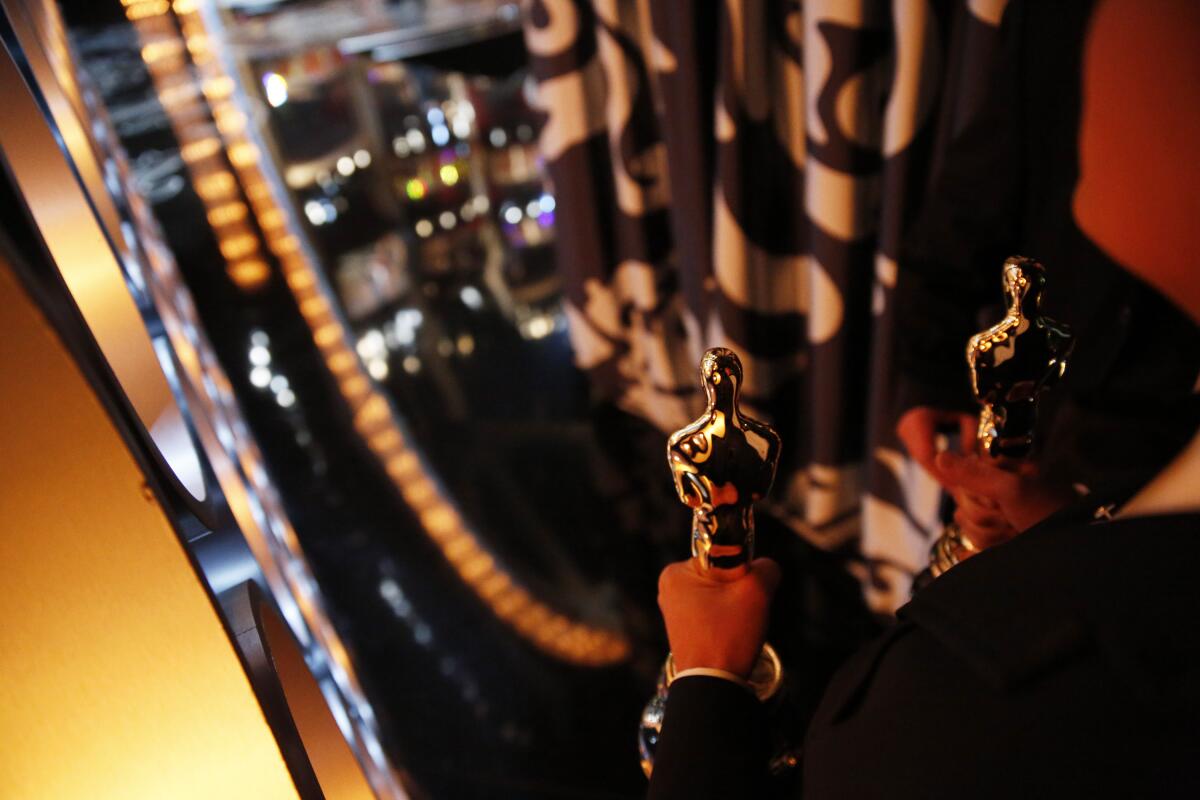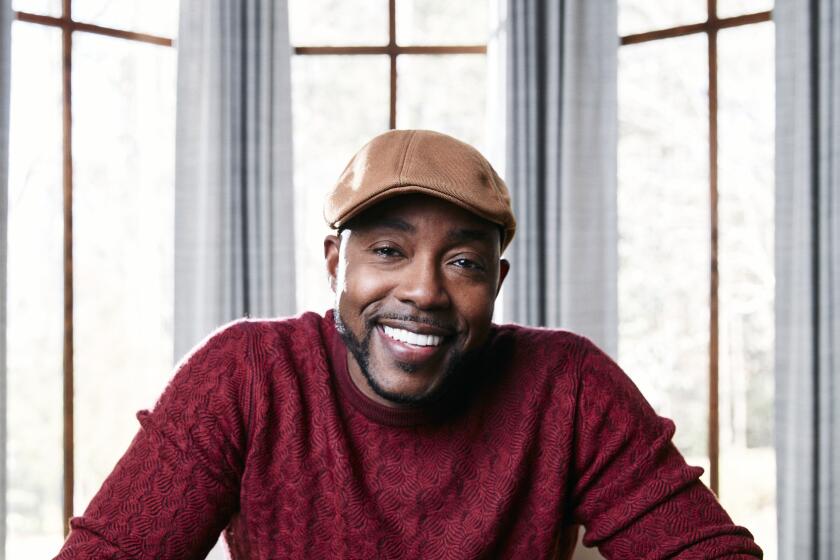The Oscars are back â but who will watch? The stakes have never been higher

On Sunday evening, millions will tune in to the 94th Academy Awards â some, the film academy hopes, watching the show for the first time or returning to the fold as domestic viewership for Hollywoodâs biggest night dwindled to a record-low 10.5 million last year.
Tom Fleischman, who won a sound mixing Oscar in 2012 for Martin Scorseseâs âHugoâ and was nominated four other times, will be among them, tuning in from his home in Nyack, N.Y. But, outraged over the academyâs recent decision to shift eight below-the-line and short-film awards out of the live ceremony, he says heâll be watching for the last time.
âThe only reason Iâm going to watch it is to see if anyone else is going to speak truth to power,â said Fleischman, who resigned from the Academy of Motion Pictures Arts and Sciences in December, frustrated over the direction the organization has taken after more than 30 years as a member. âWinning an Oscar is the pinnacle of oneâs career, and theyâve demeaned it. Itâs unconscionable.â
The theme of this yearâs Oscars is âMovie Lovers Unite,â a rallying cry for film fans at a moment when the medium is facing a deep existential crisis accelerated by the COVID-19 pandemic. But within the academy, as the organization struggles to rebound from last yearâs widely panned, pandemic-dampened telecast, that sense of unity has been fractured by weeks of bitter in-fighting over the very meaning and future of the awards.
For an academy already wrangling with thorny issues of inclusion and the financial burdens of a costly, recently opened museum, the firestorm over this yearâs show has exacerbated existing strains and opened up new wounds.
âItâs only a tiny matter in the vast scale of world events at the moment,â said one current nominee, who declined to speak on the record due to the sensitivity of the situation. âBut it has been a painful period for the academy.â
Last month, pressured by its broadcast partner ABC to tighten and reinvigorate the often bloated telecast, the academy announced that the Oscars for the crafts of film editing, makeup and hairstyling, original score, production design, and sound, as well as the three short-film categories, will be given out off-air in the hour before the show begins. The winners will be revealed to the public on social media and clips of the acceptance speeches will be edited into the broadcast.
While Oscars planners say viewers at home may not even notice the changes, the announcement drew swift and fierce criticism from various guilds, industry organizations and current nominees including Jane Campion, Steven Spielberg, Denis Villeneuve and Guillermo del Toro. In an open letter, 70 prominent film professionals, including James Cameron, John Williams and former academy governor Kathleen Kennedy, blasted the plan, saying it would do âirreparable damageâ to the Oscarsâ reputation by treating some of filmâs most vital craftspeople as âsecond-class citizens.â
With the Oscar ceremonyâs traditions being turned upside down, it feels appropriate that the awards themselves might go their own way too. Watch for surprises.
Like many of his colleagues in the industry, Alan Heim, the Oscar-winning editor of âAll That Jazzâ and president of the Motion Picture Editors Guild, found out about the changes to the show in the press. âItâs a terrible slight to all of us who make a movie,â Heim said. âTo get nominated for an Academy Award is a tremendous honor and this cheapens the honor by making one category less than the other.â
Three years ago, Heimâs guild, along with others, successfully fought a similar plan to give out four awards during commercial breaks in that yearâs telecast, forcing the academy to reverse the decision just days before the show. But with Oscar ratings plummeting by roughly 75% since 2014, academy leaders argue they can no longer avoid difficult changes.
âWe must prioritize the television audience to increase viewer engagement and keep the show vital, kinetic, and relevant,â academy President David Rubin wrote in his letter announcing the plan, which was endorsed by the organizationâs officers and awards committee. âThis has been an important focus of discussion for quite some time.â
First-time Oscars producer Will Packer, whose credits include the hits âGirls Tripâ and âRide Along,â defends the decision. At a time when audiences are awash in entertainment choices, he believes the telecast needs to draw in more casual movie fans if it is going to survive, particularly as relatively few people have seen many of this yearâs nominated films.
âYou have to be very honest about where we are,â Packer said. âThe awards are absolutely what you anchor your show. But that doesnât mean thatâs the only thing you use to bring people under the tent. What can I add? What are the elements that would make broad swaths of the public tune in? What would they give a damn about? Thatâs how Iâm looking at it.â
Cutting important categories from its live telecast and Twitter-sourcing fan favorites wonât do a beleaguered motion picture academy any favors.
In an effort to pump up the showâs populist appeal, this yearâs telecast is bringing back hosts for the first time since 2018. Regina Hall, Amy Schumer and Wanda Sykes will be the ceremonyâs first-ever all-female hosting trio. Another first: a fan-favorite award, voted on via Twitter. (Itâs not an official Oscar, but will be announced during the telecast.) A live performance of the smash-hit song âWe Donât Talk About Brunoâ from âEncantoâ will be staged â even though the original tune was not submitted for Oscar consideration by Disney, the parent company of ABC â and a number of the presenters will come from outside the movie business, including DJ Khaled, snowboarder Shaun White, surfer Kelly Slater and skateboarding legend Tony Hawk.
Many of the innovations have been greeted with derision by academy members and cineastes, who regard them as cheap pandering and unlikely to move the ratings needle. As Hawk wryly noted on Twitter, âIf being in every âJackassâ movie, âxXx,â âPolice Academy 4â and âSharknado 5â doesnât qualify me to present at the Oscars, then your taste in movies needs readjusting.â
Meanwhile, the academy has insisted that all of this yearâs nominees will be treated with equal respect and has encouraged as many Oscar attendees as possible to be in the Dolby Theatre for that first non-televised hour, which will be emceed by Josh Brolin and Jason Momoa (who co-starred in the heavily favored crafts contender âDuneâ and are arguably best known for their roles as Thanos and Aquaman, respectively, in the Marvel and DC cinematic universes).
But with the red carpet preshow airing during that hour, many stars and nominees feel put in an awkward situation at a fraught moment, as an industry obsessed with its image undergoes an identity crisis in real time in front of the world.
âI donât really understand who they think the show is for,â said one longtime awards consultant, who declined to be named because they are working with several nominees this year. âI get that the show has to evolve and theyâre hoping to expand the audience. But I donât know why they thought the only options were to do it exactly as they did it before or to take [those eight awards] off camera.â
L.A. Times critics, reporters and Academy Awards experts on everything you need to know before your Oscars 2022 viewing party. Even the menu!
In the days leading up to the Oscars, as industry insiders have gathered for preshow parties and events, the controversy has continued to dominate the conversation. At a party Friday for female nominees hosted by the advocacy group Women in Film, set decorator Rena DeAngelo, nominated for the production design of âWest Side Story,â said she felt her craft was being slighted.
âThe academy is the embodiment of filmmakers, and cutting us, cutting our time, to make room for banter and dance routines, it really hurt,â DeAngelo said, noting that Spielberg, who directed the film, was planning to be seated in the theater in solidarity when her category was given out. âI was like, âOh, youâre trimming the fat and weâre the fat.â ⌠Theyâre trying to find an audience that doesnât exist, and I think they need to go back to the drawing board and start over.â
Agreeing on a shared vision for the Oscars has proven difficult. In a statement earlier this month, academy governor Laura Karpman, one of three representatives of the music branch, said she was âshocked that the officers of the Academy denied the Board of Governors the opportunity to voteâ on the changes to the show, saying they caused âa wound in the heart of the music community.â
Speaking at Fridayâs Governors Awards â an event focused on honorary awards once part of the Oscars telecast â Rubin noted how painless the process to select honorees including Samuel L. Jackson and Elaine May was for the groupâs 54-member board of governors compared with other, more contentious matters. âIf only all our board meetings were that brief and that harmonious,â he said to knowing laughs from the crowd.
It remains to be seen how the controversy will impact the telecast. According to Karol Urban, a rerecording mixer and president of the Cinema Audio Society, some of this yearâs winners may hold their trophies upside-down onstage as a form of silent protest. Others may use their moment to speak out more directly.
As the Oscars hope to stem a ratings slide, producer Will Packer discusses the controversy over this yearâs changes to the show and what viewers can expect.
The outcry isnât simply a matter of wounded pride, Urban said; the deviation from decades of Oscar tradition has tangible economic implications for the impacted craftspeople. âIt infers inequities of value, and this inference makes it difficult for us to advocate for ourselves in contract negotiations,â Urban said.
Four-time Oscar-nominated sound mixer Peter Kurland, who worked on this yearâs âThe Tragedy of Macbeth,â informed the academy last week that, like Fleischman, he will resign from the group without a remedy to the situation. Among the academyâs roughly 10,000 members, others are said to be privately contemplating doing the same.
âI donât know that this is the most effective way for me to object to the academyâs decision,â said Kurland, who joined the academy in 2009. âBut I did not feel comfortable remaining in the academy, knowing that the people in my branch and other branches were going to be treated disrespectfully.â
Packer, who finds himself on the front lines of a battle for the soul of the Oscars, says he understands such strong emotions. But in the end, he hopes everyone will come together to safeguard a show that, in addition to celebrating the highest achievements in film, provides a crucial marketing platform for the entire movie business.
âWe may disagree â smart people do all the time, and thatâs okay,â Packer said. âBut some people, even some within the industry, they just want the thing to burn. Theyâre like, âBlow it all up.â Well, Iâm not one of those people. Especially this year.â
Times staff writer Glenn Whipp contributed to this report.
Ahead of Sundayâs 94th Academy Awards, hereâs your guide to whoâs hosting, whoâs nominated, why thereâs been controversy, and when and where to tune in.
More to Read
Only good movies
Get the Indie Focus newsletter, Mark Olsen's weekly guide to the world of cinema.
You may occasionally receive promotional content from the Los Angeles Times.
















